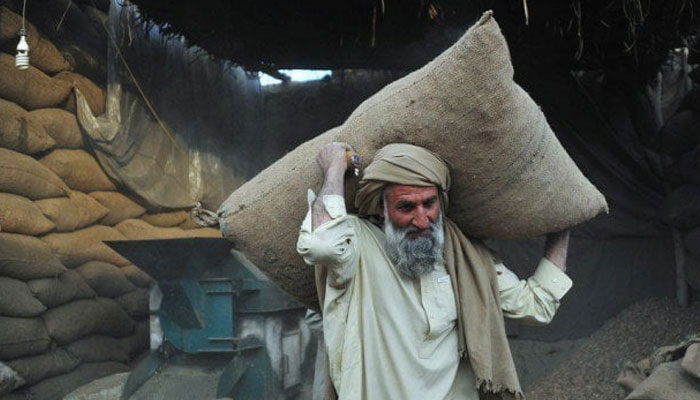Vulnerable workers of Rawalpindi
Many workers sit on pavements across the city while waiting amidst tens of workers for their turn to get work. “If I come and sit here, there is a chance of me finding a job for the day and there is also a certainty that I will find food for me and my wife,” says Akbar Hussain sitting on Gulzar-e-Quaid pavement.
“I am a native of Karachi; I was working in a teashop until COVID-19. After the closure of teashop during the pandemic, my wife and I found it difficult to make ends meet. The first wave of COVID-19 made us homeless. We could not afford the rent and so our house owner forced us out of the house. Our children also abandoned us. We had nowhere to go. So, we boarded a train and came to Rawalpindi in search of a job,” says Moujiz Abbas.
“Many people like Akbar and Moujiz who are mostly homeless and street dwellers, start gathering at the nearest pavement from their homes as early as 9.30 am. Most of these pavements are located near commercial markets. By around 10 am, a few non-governmental organizations that provide free breakfast to the workers start distributing food,” says Musawir Ali.
“People who hire them on behalf of the contractors for jobs ranging from laying roads, cleaning septic tanks, cleaning sewage lines, painting buildings, catering services, construction works, and driving four-wheelers, arrive there. There is no set time for them; they come anytime between 9:30 am and 12.30 pm. As they scan through the workers standing in a line, they look out for potential workers,” says Altaf Hussain.
“They will announce the work and ask who is qualified for the work. Certain work requires skilled workers. Other works only require physical strength. They will pick the workers accordingly and tell them the fixed wage for the day. There is no paperwork for this. For the contractors, these pavements are a key labor market where they handpick the workers they need, most times for less than minimum wage. At the end of the day, the workers will be paid in cash,” adds Altaf.
“Some of the workers know the people who hire them on behalf of the contractors who show up regularly. If we make ourselves familiar with such people, it is easy to get jobs,” says Mubarak Ali. Zakir Hussain says, “When I asked another worker Naveed, why he prefers to come here to find work for the day rather than a job that provides fixed wages, he says, “I am already finding it hard to make ends meet on a day-to-day basis, how I will be able to survive on a monthly salary? Now, I earn one day and survive with it for the next few days until I find the job again.”
-
 Kim Kardashian And Lewis Hamilton Make First Public Appearance As A Couple At Super Bowl 2026
Kim Kardashian And Lewis Hamilton Make First Public Appearance As A Couple At Super Bowl 2026 -
 Romeo And Cruz Beckham Subtly Roast Brooklyn With New Family Tattoos
Romeo And Cruz Beckham Subtly Roast Brooklyn With New Family Tattoos -
 Meghan Markle Called Out For Unturthful Comment About Queen Curtsy
Meghan Markle Called Out For Unturthful Comment About Queen Curtsy -
 Bad Bunny Headlines Super Bowl With Hits, Dancers And Celebrity Guests
Bad Bunny Headlines Super Bowl With Hits, Dancers And Celebrity Guests -
 Insiders Weigh In On Kim Kardashian And Lewis Hamilton's Relationship
Insiders Weigh In On Kim Kardashian And Lewis Hamilton's Relationship -
 Prince William, Kate Middleton Private Time At Posh French Location Laid Bare
Prince William, Kate Middleton Private Time At Posh French Location Laid Bare -
 Stefon Diggs Family Explained: How Many Children The Patriots Star Has And With Whom
Stefon Diggs Family Explained: How Many Children The Patriots Star Has And With Whom -
 ‘Narcissist’ Andrew Still Feels ‘invincible’ After Exile
‘Narcissist’ Andrew Still Feels ‘invincible’ After Exile -
 Shamed Andrew ‘mental State’ Under Scrutiny Amid Difficult Time
Shamed Andrew ‘mental State’ Under Scrutiny Amid Difficult Time -
 Bad Bunny's Super Bowl Halftime Show: What Time Will He Perform Tonight?
Bad Bunny's Super Bowl Halftime Show: What Time Will He Perform Tonight? -
 Where Is Super Bowl 2026 Taking Place? Everything To Know About The NFL Showdown
Where Is Super Bowl 2026 Taking Place? Everything To Know About The NFL Showdown -
 Chris Pratt Explains Why He And Katherine Schwarzenegger Did Premarital Counseling
Chris Pratt Explains Why He And Katherine Schwarzenegger Did Premarital Counseling -
 Drake 'turns Down' Chance To Hit Back At Kendrick Lamar At Super Bowl
Drake 'turns Down' Chance To Hit Back At Kendrick Lamar At Super Bowl -
 Sarah Ferguson Had A ‘psychosexual Network’ With Jeffrey Epstein
Sarah Ferguson Had A ‘psychosexual Network’ With Jeffrey Epstein -
 Miranda Kerr Shares The One Wellness Practice She Does With Her Kids
Miranda Kerr Shares The One Wellness Practice She Does With Her Kids -
 Czech Republic Supports Social Media Ban For Under-15
Czech Republic Supports Social Media Ban For Under-15




